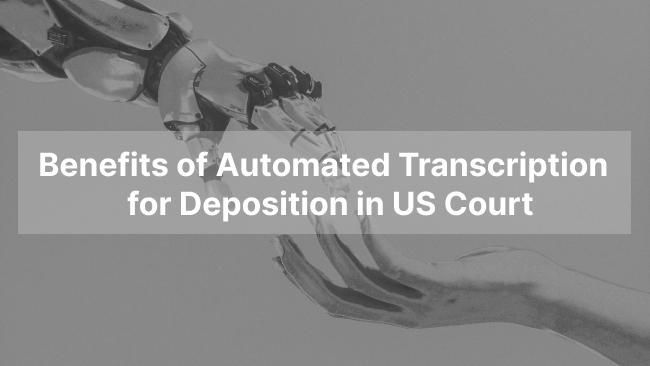A Quick Guide to Outsourcing Transcription for Legal Needs
June 2024
·
5 min read

Transcribing audio and video evidence in a legal case provides significant value to lawyers and attorneys. These transcripts can be an asset when analyzing cases, identifying key events, and presenting your case in court.
However, in-house legal transcription can be costly, time-consuming, and resource-intensive. Therefore, as a legal professional, it is essential to understand when, how, and where to outsource your legal transcription needs.
In this article, I will share everything you need to know about outsourcing your legal transcription needs.
Different outsourcing options for legal transcription needs
1. Automated Transcription Software
AI transcription has improved accuracy by miles over the last couple of years. You can decide to opt for a service that provides AI transcription for a legal niche.
Two best options:
2. AI in combination with human transcription
An interesting approach to getting your transcription for Legal needs is a combination of AI + humans. You can get instant transcription with AI so that you can start your work immediately. And in the meantime, a human transcriber works on it to further proofread and improve the accuracy.
This is the best option if you eventually need accurate transcription but don't want to wait for human transcribers to send you the first draft.
Two best options:
3. 100% Human transcription
There might be cases where AI might not be an option for whatever reason. In that case, the only option for you is to opt for a service that provides 100% human transcription for legal.
Two best options:
Why you should outsource your transcription needs
1. Save time and increase efficiency
Transcribing audio-visual evidence can take hours. Transcription is not only physically taxing, but also emotionally draining for you and your employees. On average, it takes a person four hours to transcribe an hour-long clip. That is four long valuable hours that you or your paralegals can focus on making your case.
Transcription providers like Reduct, allow you to get rapid AI legal transcription, and upgrade it to human transcription whenever needed.
With instant transcription, you can search, highlight, and share transcriptions and other findings more efficiently.
2. Save costs
Hiring and maintaining an in-house team to handle the transcription is costly. And it’s not easy. The onboarding and training of transcribers itself takes a long period and money.
Instead, outsourcing your transcription needs to a trusted service provider gives you access to several professional legal transcribers who can give back quality work at a fraction of the cost.
3. Let the experts handle your transcription
Next time you have a dilemma about whether you should do the transcription in-house or outsource it, imagine a client telling you that they want to fight their case.
If that sounds ridiculous, transcribing your legal documents in-house sounds similar. A single error or not having the transcripts on time can jeopardize your case.
Transcription companies are proficient in utilizing multiple human transcribers, systematic procedures, and advanced technologies to conduct legal transcription accurately in large quantities.
4. Customizable formatting
The transcription process entails more than simply transcribing the spoken speech word by word. Details useful in building a case and presenting evidence- like timestamps, correct speaker labels, and [inaudible] and [crosstalk] tags- are needed.
You can get your transcripts formatted in a way that benefits your workflow the most. Some transcription providers like Reduct can securely store your data on the cloud and make it accessible from your smartphone.
Things to consider before outsourcing your legal transcription needs.
1. Data privacy and security
The first thing to check before you decide to outsource legal transcription is how secure the transcription provider is. Weak data security and confidentiality can make your data prone to outsiders. Depending on the content of your transcript, any data breach can prove costly.
Look for any guaranteed assurance of confidentiality, like compliance or a license, while choosing a transcription service. Also, ensure that there is an NDA for the transcriptionists and employees.
2. Experience
Does a company with 20,000+ hours of completed transcription sound reassuring? Of course, it does. A transcription service that has been in business for a long time indicates that they are doing something right.
More often than not, it is a sign that the company has been able to deliver quality service. It is also important to check if the service providers have worked with a legal firm before.
3. Quality or accuracy
You should never compromise on quality when it comes to legal transcription.
It might not always be possible to try a service before opting for it, but it’s safe to check if they provide a free trial and evaluate if their quality standards are satisfactory for your use case.
Scan customer testimonials and try out free trials, if provided, to test their quality standards.
4. Additional tooling on top of transcription
Some transcription companies limit their services to just transcription. However, our team at Reduct has been trying our best to help legal firms with the audio-visual discovery process. It might be worth looking at how you can use the transcription you receive.
Can you collaboratively review them? Is it possible to download it in court-required format?
It might sound too good to be true, but the transcription you receive in Reduct can help you cut and merge videos to compile video evidence, without prior video editing experience.
Learn more about it here: Power of Video for Criminal Defense Attorneys
How does legal transcription outsourcing work?
Step 1: Send audio or video to a third-party transcription company
Transcription companies usually provide you with a platform where you can upload all your videos or audio.
Some companies even allow you to directly import your audio-visual evidence from other video-conferencing tools like Zoom.
Step 2: Receive transcription
After the initial transcription is complete, a lot of companies deploy an internal process to proofread and check for mistakes. When everything is done on their end, they send back the textual format of the transcript that can be downloaded from their platform.
Ready to outsource your legal transcription needs?
Outsourcing your legal transcription will give you the benefits we mentioned above, but only if you choose the right partner.
With over 16,000 hours of audio transcribed, Reduct is a transcription veteran. Contact us to see how we can assist you with your legal transcribing requirements.


